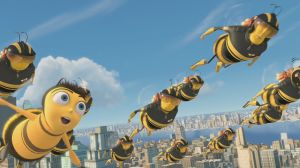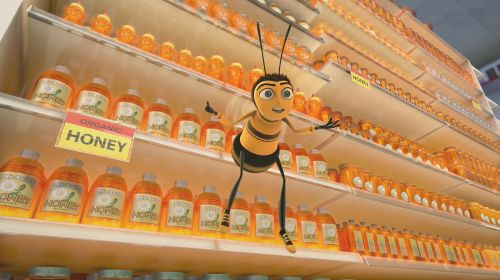 Bee Movie (Steve Hickner & Simon J. Smith, 2007)
Bee Movie (Steve Hickner & Simon J. Smith, 2007)
Nearly a decade ago, in 1998, Dreamworks released Antz. It marked the emergence of the first major competitor to Pixar in the field of computer animation, a rivalry highlighted by its superficial similarity to Pixar’s release for that year, A Bug’s Life. While both were good films, the Dreamworks offering was exciting for the alternative perspective it offered: where the Pixar film advocated a comfy theme of community solidarity, Antz satirised the hive / mob mentality and offered a more cynical voice than the Disney-backed Pixar studio could. This diversity of approach seemed an eminently healthy start to the computer animation boom. It’s a little disheartening, then, to now be confronted with Bee Movie, a lightweight and mediocre retread of Antz that sees almost everything of interest leached from the Dreamworks recipe. Pixar are still making interesting (if uneven) films, but Bee Movie is a telling example of the mediocrity that has characterised their competition.
Bee Movie is Antz-lite in a number of respects. Like Antz, it uses the communal nature of insect ecology as a starting point for both jokes and social commentary. Like Antz, the insect city is located within the heart of New York (although Bee Movie makes more use of that location). And of course, the film is built around the comic persona of Jerry Seinfeld (who co-scripted) in much the same way that Antz used Woody Allen. Seinfeld voices Barry B. Benson, a bee who (like Allen’s ant Z in the earlier film) is somewhat dissatisfied with his place in the machinery of the hive. His quest for fulfilment takes him out into New York, where he meets the understanding human Vanessa Bloome (voiced by Renee Zellweger). When he discovers humans are harvesting honey, he launches a crusade to reclaim it for the bees.
It is somewhat apt that Seinfeld stars in this retread of the earlier Allen vehicle. Seinfeld was always television’s answer to Woody Allen: his sitcom was a mass-market, populist variation on the world of upper-class neurotic New Yorkers that Allen had shown in his films, shifting the focus from the preoccupations of the intellectual elite to the trivia of everyday life. So it is fitting that Seinfeld now appears in a dumbed-down version of the Allen-focussed Antz. This isn’t a bad thing – I’m a huge fan of Seinfeld, and my comment about him taking Allen’s world to the masses isn’t meant as a put-down. But unfortunately there isn’t anything like the comic inventiveness of Seinfeld (the show) in Bee Movie. Instead, the film opts for exactly the kind of formulaic storylines, character relationships, and faux-heartfelt themes that were banished from Seinfeld’s sitcom.
Sure, it is just a kid’s film, and there are those who baulk at applying the usual critical criteria to films aimed at children. The problem with that is that it fails to recognise that all the things that matter in films for books for adults matters in kids fiction too. The paradox of so-called “kid’s films” is that the really good ones – things like The Wizard of Oz, or Dumbo, or Bambi, or E.T., or Toy Story – don’t warrant the term at all, because they are engrossing stories that appeal to viewers of any age. Children might not be able to articulate the difference between good films and those put together with less care, and they’ll soak up all sorts of things adults wouldn’t sit still for, but I do think they respond to quality if it’s provided to them. On the other hand, if slipshod plotting and insincere characterisation are given a passing grade in a film aimed at kids, we risk simply defining kids movies as those too bad for adults to watch. And that is what bothered me most about Bee Movie. It feels like more of a kid’s movie than Antz not because it’s aimed at a younger audience – indeed, most of Seinfeld’s comedic patter will be lost on children – but because it’s just not very good.
The early scenes in the hive are too familiar, given their similarity to Antz and other films, but not actually bad. The problems really start when Barry leaves the hive, and starts interacting with humans. Animated films walk a very fine line when they show their talking animals interacting with humans, because to do so invites us to think about the implications of a generic conceit that is best left unexamined. When, in Bee Movie, Vanessa registers amazement at the appearance of a talking bee, it raises all sorts of awkward questions about the way the fantasy world we see in the hive interacts with the film’s essentially realistic human world. It’s not impossible to make such interaction work – Ratatouille did a similar thing with more success – but the interplay between human and bee worlds in Bee Movie isn’t at all well thought through. When Barry launches a lawsuit against the human companies that sell honey, we are asked to believe that the whole human world has suddenly become aware that bees can talk: this raises way too many issues for the film to sort through, and characters later in the film (such as a pair of pilots that Barry startles in the film’s climax) apparently remain unaware of the development.
More of a problem than such logical inconsistencies is the derivativeness of the film’s plotting. The real genius of Seinfeld’s television show was not the observational humour (which here alternates with bee puns throughout Barry’s dialogue) but its anything-for-a-laugh confrontation of the conventional sitcom wisdom that characters must care for each other and learn moral lessons. Having challenged such formulaic writing in sitcoms, it’s disheartening to see that he and his collaborators have so wholeheartedly embraced the received wisdom about how animated films should be made. Barry’s relationship with Vanessa, for example, seems to have romantic overtones only because the filmmakers felt some sort of romantic plot was needed: certainly nobody’s heart seems to have been in it, and the scenes between the two are awkward and insincere.
Likewise, the film seems to have a moral only because the filmmakers felt that was the done thing in this kind of film. The message is that even little jobs can be worthwhile if done well: there’s nothing really wrong with that, although it is much the same as the slogans Antz mocked as totalitarian propoganda. However, the moralising seems particularly tacked on here because the film makes a huge deviation with Barry’s pursuit of honey manufacturers for their “theft” of bees’ honey. Has there been a more harmless group demonised in a major Hollywood film than beekeepers? It never makes a great deal of sense, and when Barry realises late in the film that his crusade has been misguided it feels more like a belated recognition of the film’s own script and logic problems.
The stultifying effects of formula are made even more obvious by the welcome moments when the film manages to do something a little more unusual. There are sequences in the second half, for example, where the writers are more willing to pursue silly ideas just for the fun of them: an interview with a bee version of Larry King; a funny scene where Sting is put on trial and forced to reveal that “Sting” isn’t his real name; and some unexpected digs at Ray Liotta. In some ways, these are the standard pop-culture jokes familiar in these kind of films, but they at least are done with a wit and relish for the gag that is otherwise missing from the film. In those moments, you have a glimpse of the film Bee Movie could have been if it had been more willing to abandon formula and focus on comedy for comedy’s sake. As it is, the film falls between two stools: the earnest attempts to make a silly plot work mean those funny moments just feel out of place.
Animation has traditionally had an anarchic undercurrent: there were classical works like the Disney features, but at the same time there were also the crazier comedic filmmakers like Tex Avery and Bob Clampett. At the moment, though, even the good computer animated films have been fairly classically constructed (something that the self-referentiality of films like Shrek challenges only superficially). If it seems I’m being harsh overly harsh on Bee Movie, it’s because it is disappointing that a major comic talent like Jerry Seinfeld could do so little to bring out the comic possibilities of the medium.
